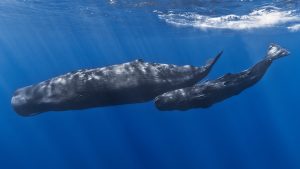September 13, 2018
The Plight of Whales
 Whales and man have had a long history together on this planet. And like so many species that co-exist with humans, the whales have suffered by the relationship.
Whales and man have had a long history together on this planet. And like so many species that co-exist with humans, the whales have suffered by the relationship.
Before the advent of kerosene in the late 19th century, whale oil was commonly used in lamps. Whales were widely hunted for their blubber to extract the oil. So pervasive was the whale hunt that one species, the right whale, is so named as it was the “right” whale to hunt—because of its slowness, docility and tendency to float when killed. It was hunted nearly to extinction.
Today, right whales are threatened largely by fishing gear and impacts with ships. Last year alone 12 were killed in Canadian waters. Only 450 North Atlantic right whales remain in the world.
Efforts to protect right whale and other cetacean species are not going well. Just Tuesday, an initiative introduced by Brazil to create a safe haven for whales in the in the South Atlantic was defeated at the meeting of the International Whaling Commission (IWC).
The sanctuary would have not only kept the mammoth mammals safe from hunting, but also would have protected them from getting entangled in fishing gear or being struck by ships. However, pro-whaling nations, including Japan, Iceland and Norway, want a resumption of “sustainable” hunting of whales and are unlikely to allow the creation of a sanctuary unless their demand is met.
Overall, the picture for both whales in the wild and those in captivity is pretty grim. But there are things you can do:
- Write the Federal Minister of the Environment Catherine McKenna to tell her that you want Canada to take more action to protect whales in Canadian waters and around the world.
- Write the Federal Minister of Fisheries and Oceans Jonathan Wilkinson to tell him you want Canada to take a more aggressive stance at the IWC to protect whales.
- Don’t visit Marineland or anywhere that profits from captured marine mammals.
- Learn more about the plight of whales and spread the word.
Maybe it’s not a lot. But it’s a start. And we need to start somewhere to protect these magnificent creatures.
Bruce Roney
President and CEO
